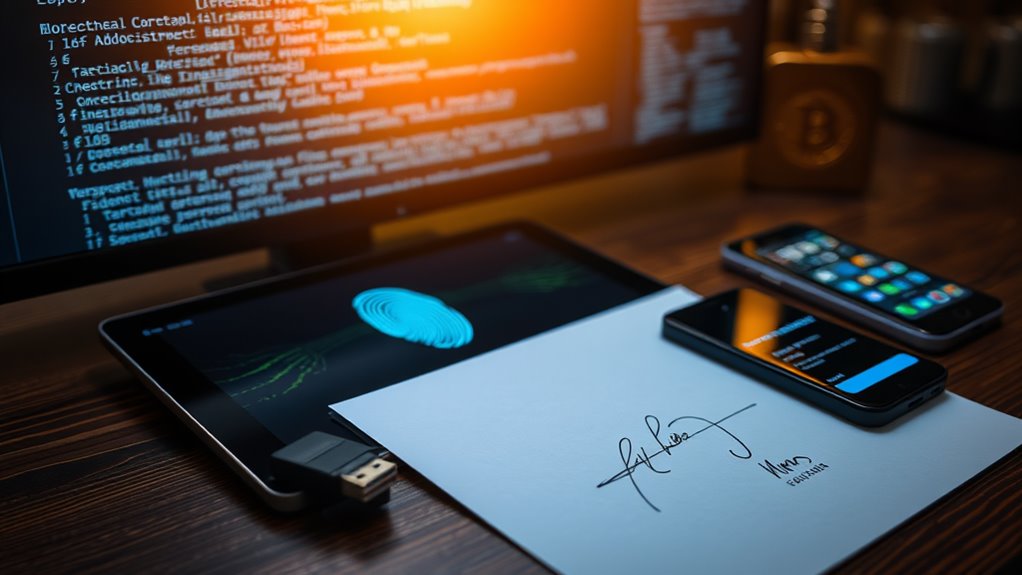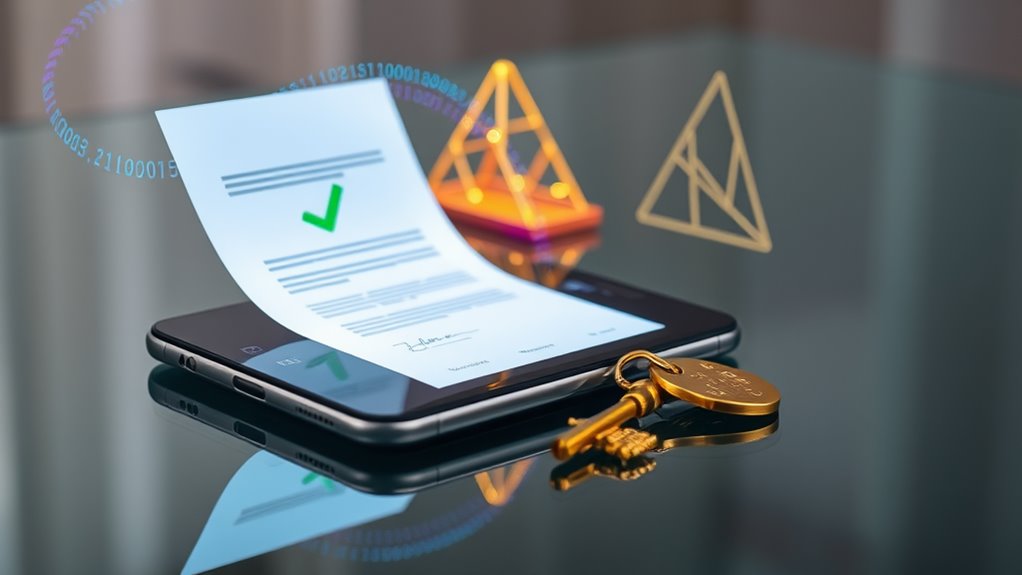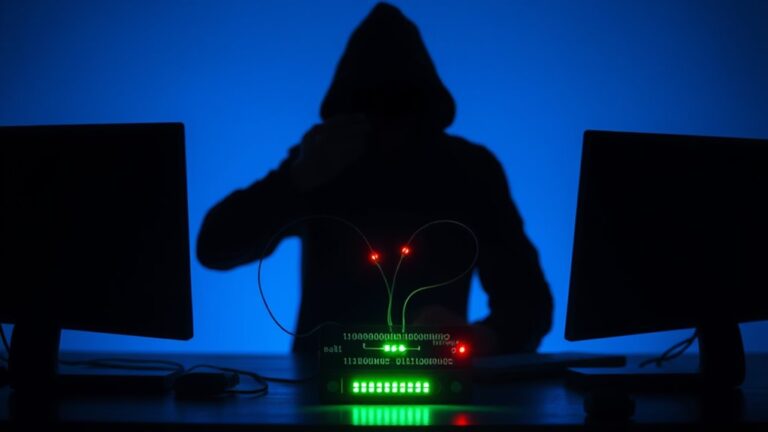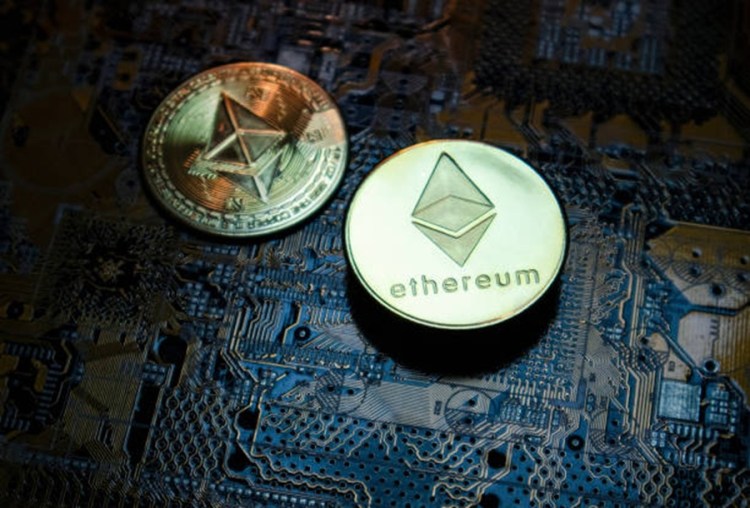Digital Signatures Explained
Note: This post may contain affiliate links, and we may earn a commission (with No additional cost for you) if you make a purchase via our link. See our disclosure for more info. The crypto world is constantly changing. This content is for informational purposes only and not financial, legal, or professional advice So, please verify the info on the cryptocurrency provider’s websites.
Digital signatures? They're basically the cool, high-tech version of your old-fashioned handwritten one. But way harder to fake. They use fancy asymmetric cryptography—so there are two keys: one public, one private. Think of digital signatures as superhero bouncers for digital messages. They make sure everything stays legit and untampered. Plus, they're legally binding in many places. Trustworthy? You bet. Stick around to find out why they're essential in the world of cryptocurrency too.

In a world where trust can seem as elusive as a unicorn, digital signatures swoop in like a superhero. Think of them as the bouncers of the digital domain, ensuring that what you send is exactly what you intended. At their core, they rely on asymmetric cryptography, which sounds fancy but boils down to a pair of keys—a public one everyone can see and a private one that's kept under lock and key.
Digital signatures are the superheroes of trust in the digital realm, ensuring your messages remain authentic and secure.
This duo works together, making sure your messages are encrypted and only readable by the right people. The magic happens through three vital algorithms that handle key generation, signing, and verification. It's like having a secret handshake that only you and your best friend know.
When you sign a document digitally, it's as if you're putting your unique stamp on it. But here's the kicker: it's way harder to forge a digital signature than a handwritten one. Good luck trying to replicate that! Digital signatures are more difficult to forge compared to traditional handwritten signatures. They also verify the sender's identity and detect any tampering, which enhances the security of the document.
Digital signatures don't just look pretty; they pack a punch by ensuring message integrity and authenticity. If someone tries to mess with your document, that signature will scream "tampered!" Plus, the sender can't just deny authorship later on—unless they want to admit they lost their private key, which is a big no-no.
And guess what? They're not just bits of code; these signatures are legally binding in places like the US and EU. They hold water in the UK, Canada, and India too, though laws can vary like the weather. In cryptocurrency systems, these signatures are essential for maintaining the blockchain's immutability and providing the trustless environment that makes decentralized transactions possible.
Frequently Asked Questions
How Do Digital Signatures Differ From Handwritten Signatures?
Digital signatures and handwritten signatures? Quite the contrast.
Digital signatures are created using fancy algorithms and cryptographic keys. Handwritten? Just a pen and paper.
Security? Digital wins, boasting encryption and tamper-evidence, while handwritten signatures are basically an open invite for forgery.
Legally, both hold weight, but digital signatures come with a higher assurance.
Verification for handwritten signatures? Good luck eyeballing it.
Digital signatures? Automated checks do the heavy lifting. Simple, right?
Can Digital Signatures Be Forged or Hacked?
Yes, digital signatures can be forged or hacked. It's not rocket science.
From fancy software to simple copy-paste tricks, the methods are alarmingly easy. Some people even use AI to whip up fake signatures that look legit.
And let's not forget, human error is always lurking, like a bad smell. If private keys aren't secured right, it's like handing out house keys to strangers.
What Legal Status Do Digital Signatures Have?
Digital signatures? They're pretty much the real deal across many places.
In the U.S., they're backed by laws like the E-Sign Act. The EU has its fancy eIDAS Regulation for cross-border stuff. India, Japan, and even places like Singapore and Argentina get in on the action, too.
But hey, not every document qualifies. Wills? Nope. Some rules are as stubborn as your school's dress code.
Are Digital Signatures Secure for Sensitive Documents?
Are digital signatures secure for sensitive documents? You bet. They use fancy encryption and public-key stuff to keep things legit.
Think of it as a high-tech lock. But don't get too comfy; key theft and malware still lurk. If someone swipes a key, it's game over.
Still, they're legally binding and come with audit trails. So, while nothing's foolproof, digital signatures are a solid bet for keeping secrets safe—mostly.
What Software Is Required to Create Digital Signatures?
To create digital signatures, you need some serious software. Think public key cryptography—because just scribbling your name isn't enough.
You'll want tools that manage cryptographic keys and integrate with certificate authorities. OpenSSL is a solid choice. Adobe Acrobat also does the trick.
But don't confuse these with electronic signature tools; they're different beasts.










